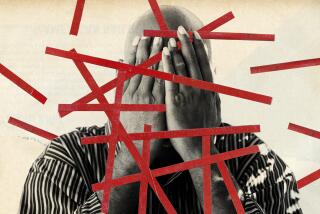Bouvia’s Right to Halt Forced Feeding Argued in Appeal Court
- Share via
Elizabeth Bouvia, the 28-year-old quadriplegic who once sought a court’s permission to starve herself to death, no longer wants to die and only seeks to have a painful nasogastric feeding tube removed, her lawyers argued Monday before a state appellate court.
“Petitioner specifically is not asking this court . . . or anyone else to assist or to watch her commit suicide,” attorney Richard Scott told a three-judge panel of the 2nd District Court of Appeal.
He said Bouvia, a cerebral palsy victim, simply wants doctors to remove the force-feeding tube that carries nearly 2,000 calories of nutrients a day to her stomach. The tube was inserted by doctors at High Desert Hospital in Lancaster.
Scott told the justices that Bouvia had maintained fairly constant weight on a liquid diet for about a year and is not in danger of dying.
However, Deputy County Counsel Steven Carnevale, representing the hospital, contended that the force-feeding was initiated because her weight had dropped dangerously.
“When they put the tube in her, she was at 67.6 (pounds),” Carnevale said, adding that was down from 72 when she entered High Desert in December, 82 last May and 100 five years ago.
“She is down to only lean tissue; she has no fat to lose,” he said.
The doctors at the hospital are “in a captive situation” as far as Bouvia is concerned, he said.
“This is a public hospital and she is a patient,” Carnevale said. “They can’t kick her out.”
He said doctors at the hospital had concluded that Bouvia could--but would not--eat and had intentionally refused solid food, insisting on an inadequate liquid diet as a means to “self-induced starvation.”
After more than an hour of arguments and questions from the bench, the justices took the case under submission. They did not indicate when they would rule on the appeal.
Bouvia’s request for an order to halt the force-feeding was denied last month by Los Angeles Superior Court Judge Warren Deering, who concluded it was “fairly clear” that Bouvia once again had “formed an intent to die.”
Deering ruled that under the circumstances of her present hospitalization, she does not have an absolute right to refuse medical treatment.
The ruling was appealed by Bouvia’s lawyers, who have consistently contended that she has a constitutional right to refuse the unwanted procedure and is not trying to starve herself.
Deering’s decision was the second key defeat for Bouvia in her fight to refuse medical care in county-run hospitals. She became a symbol of the right-to-die movement in the United States in December, 1983, when she requested court permission to starve in Riverside General Hospital. However, a judge rejected her bid, declaring that society’s right to preserve life overrode her right to control her destiny.
“Why isn’t she taken out of there?” Justice Donald Gates asked Scott during Monday’s hearing. “You indicate she is in agony (with the tube in place), that her constitutional rights are being trampled. Is there no doctor who disagrees with this (procedure) enough to take her out?”
Scott replied that placement of Bouvia elsewhere would be “very, very difficult.”
“This young woman, who is totally paralyzed, needs continuous care around the clock,” he said. “She can’t do anything for herself.”
He said her lawyers had tried and found “no nursing home in this county would take her.” He said she is young, not terminally ill and requires very long-term care and therefore, is “not financially desirable to nursing homes.”
Question Posed
At one point, Justice Edwin Beach asked Scott that if some accommodation could be reached for removal of the nasogastric tube, with doctors fully explaining the possible consequences to the woman, would she be willing to forgo her multimillion-dollar lawsuit against the hospital and doctors who ordered the tube.
“I think the lawyers (for Bouvia) would accept it, and I think she will accept it,” replied Scott, a member of the team of ACLU lawyers representing Bouvia.
Bouvia’s lawsuit, besides injunctive relief, asks for general damages of $10,000 for each day the unwanted tube is in place and punitive damages of $10 million.
More than once during the hearing, Presiding Justice Lester Roth commented, “It’s her body.” At one point he said, “She is of sound mind. . . . She can make a will, can’t she? . . . It has long been decided she doesn’t have to be a vegetable” for treatment to be discontinued.
Dialysis Case
In the case of dialysis, Roth noted, if the patient does not show up for treatment, everybody knows he is going to die, yet he has the right to refuse.
“The difference between this and precedent ‘right-to-die’ cases,” Carnevale said, “is that here we have a woman who does not have a fatal disease who wants to die.”
He said none of the precedent cases had dealt with a patient who was not terminally ill.
More to Read
Get the L.A. Times Politics newsletter
Deeply reported insights into legislation, politics and policy from Sacramento, Washington and beyond. In your inbox twice per week.
You may occasionally receive promotional content from the Los Angeles Times.










